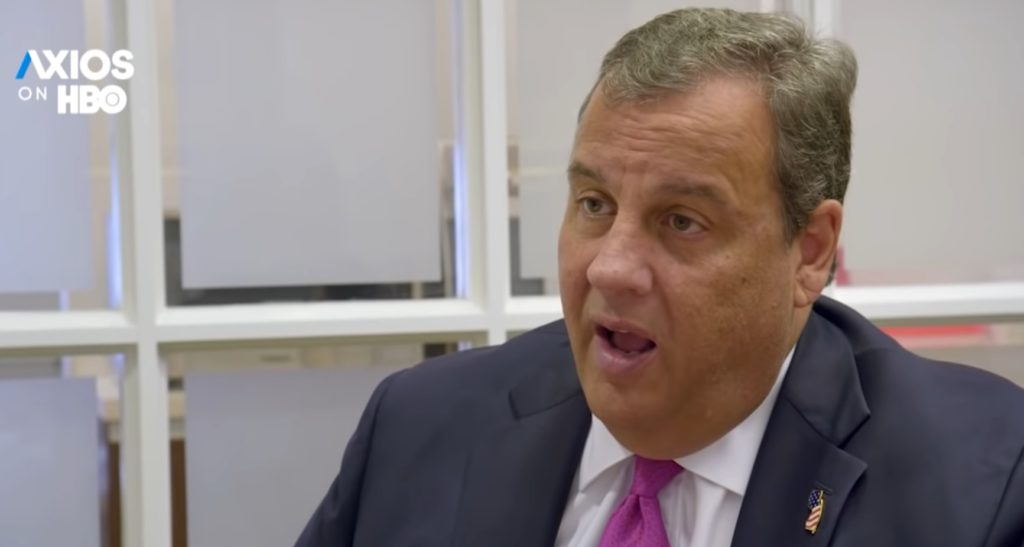Christie's Shutdown Experience Limited to the GW Bridge

The gubernatorial election is some 19 months off, but a handful of Republicans, convinced Gov. Phil Murphy will seek a second term, have begun nipping at his heels, raising questions about his Administration’s response to the COVID-19 pandemic and how he intends to deal with the unprecedented economic catastrophe the crisis has produced.
Former Assemblyman Jack Ciattarelli, the only announced candidate so far, and state chairman Doug Steinhardt, reflecting a growing public restiveness over the stay at home order, have criticized the governor for refusing to lift his business closure directive which has led to heretofore unheard of unemployment levels.
Even former Gov. Chris Christie in his quest to remain relevant and the center of attention, called for re-starting the state’s commercial engine, airily dismissing concerns over spreading the virus with the rather cold-hearted comment that “there are going to be deaths no matter what.”
His expertise is suspect since his sole experience with shutdowns is limited to the George Washington Bridge.
State Sen. Joseph Pennachio (R-Morris) weighed in as well, expressing his dismay that Murphy has used the term “knucklehead” to describe those who disregard social distancing and mask wearing directives or insist on gathering in large groups.
It could be worse, of course. The governor could use that uniquely New Jersey epithet directed toward the driver who just cut you off on the Garden State Parkway, Turnpike, Route 80, 287, etc. (Hint: It starts with an “a.”)
To be sure, the concern over the personal toll on New Jerseyans from the extended restrictions on their normal routines is genuine and legitimate.
The anxiety over lost employment runs even deeper as the suddenly out of work breadwinners exhaust their savings simply to stay above water while an overburdened state system is incapable of delivering compensation for weeks on end.
Murphy, confronted with an existential crisis unlike any his predecessors faced, has struggled to maintain a balance between protecting the public from a rapidly-moving virus for which there is no cure and preserving a semblance of everyday normality in the face of 130,593 identified infected individuals and 8,244 deaths as of May 5.
The criticisms from Republicans have been rather mild, at least by the standards which rule political discourse today and seem to be directed more toward instilling doubts in the public mind early about Murphy’s skill and judgment in dealing effectively with an issue of the pandemic magnitude.
Ciattarelli latched onto and repeated a remark from a legislative Republican, describing the governor as “King Murphy” --- a nickname more juvenile than original --- for relying almost exclusively on his emergency powers authority to impose restrictions and sanctions.
At this point, Murphy enjoys significant majority support for his handling of the crisis, including business closures, the ban on large gatherings, social distancing, the mask-wearing mandate, and ending the academic year for schools.
He closed state parks and later re-opened them under capacity and social distancing rules while many beaches and boardwalks remain off limits even as the Memorial Day weekend looms.
His daily briefings have been impressive for their candor and depth of information. He is in the middle of a public health crisis for which there is no precedent, no operators’ manual, no prior experience to call on and he’s performed admirably.
He will be tested severely, however, in the coming weeks and months --- perhaps more so than any of his predecessors --- when the full extent of the crushing impact on the state’s fiscal condition becomes clear.
Tax revenue has cratered and could worsen while reaching pre-pandemic employment levels will take many months. Business recovery – if not survival --- will take at least as long.
While Murphy has not dealt in specific numbers, he’s warned darkly that revenues have plummeted and, in the absence of dramatic legislative and administrative actions, government faces the prospect of massive layoffs and unprecedented spending reductions, primarily in state aid programs which translates into significant property tax increases.
There will be Federal assistance in the billions of dollars to partially offset the loss of revenue but the major burden inevitably will fall on state government.
While Murphy has avoided recommending specific steps at this stage, he has raised the idea of billions of dollars in bonded indebtedness to supplement a belt-tightening austerity the likes of which hasn’t been seen.
It will be on the fiscal battlefield that the partisan war will be fought. Some agreements may be reached, but many other money-saving proposals will generate significant controversy. Bonded debt in the billions of dollars will be particularly unpalatable and likely the subject of litigation on the question of whether such debt can be used constitutionally to finance ongoing operations.
As the pandemic hopefully wanes over the coming weeks and months, attention will turn to economic recovery and the path the Administration charts to regain fiscal stability.
The recent preliminary heel-nipping will increase in frequency and volume as the politically charged 2021 election year draws closer.
Murphy may well emerge from the public health crisis in a strong position, but it will be the fiscal crisis which will soon become dominant.
Carl Golden is a senior contributing analyst with the William J. Hughes Center for Public Policy at Stockton University.





